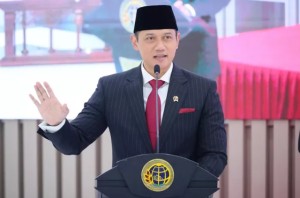NTT Governor to review geothermal projects in Flores amid mounting concerns
East Nusa Tenggara (NTT) Governor, Melkiades Laka Lena, has decided to review the controversial geothermal power plant projects on the island of Flores, citing flaws in its design and implementation.
Governor Laka Lena announced his decision to reconsider the projects during a visit to the Archdiocese of Ende on April 4, 2025, where he discussed a range of development concerns in the region.
“We have discussed various development issues in NTT, particularly in Ende Regency, including objections from bishops across Nusa Tenggara regarding the geothermal projects,” the Governor wrote on his Instagram account as quoted on Wednesday, April 9, 2025.
“We recognize there were many shortcomings, as the projects were poorly planned from the beginning,” he said. “Projects that are already underway must be evaluated and improved. For those yet to begin, we will suspend all new developments. Geothermal projects must be safe. Otherwise, they should not proceed at all in this region.”
The geothermal projects in areas such as Poco Leok (Manggarai) and Mataloko (Ngada) have been met with strong opposition due to their negative environmental and social impacts. Local residents have reported land degradation, pollution of water sources, damage to agricultural land, and corrosion-related structural damage to nearby homes.
The governor’s decision has won support from the Flobamora Community Communication and Advocacy Forum (FKKF) Jakarta.
“Governor Melki’s decision reflects his sensitivity to the voices of the Flores people and the Catholic Church in Nusa Tenggara,” Marsellinus Ado Wawo, Chairman of FKKF Jakarta, said. “The geothermal projects have created anxiety, disrupted lives, and caused environmental and material damage. His decision to reevaluate is the right step.”
Environmental, social damages
Opposition to geothermal development has grown over the years due to unexplained environmental anomalies and health risks. In one case, land in a village in southern Ngada reportedly split apart, raising suspicions of a link to nearby geothermal exploration activities.
“A village in southern Ngada saw its land crack down the middle. We strongly suspect this is connected to geothermal drilling nearby,” Marsellinus said.
He emphasized that land and agriculture are essential for the livelihoods of Flores residents, most of whom rely on farming to meet their basic needs.
“The government should prioritize food security. Electricity can be sourced from alternatives like solar, wind, and biomass,” he argued. “Food is our first need. Without rice, tubers, coconuts, coffee, and cloves, how can we survive?”
Energy alternatives, accountability
FKKF Jakarta asked the NTT provincial government to explore more sustainable and community-friendly energy alternatives. They also called for accountability from geothermal project stakeholders, demanding repair for environmental and material damages caused.
“All parties involved must be held responsible for the damage and distress caused to local communities,” Marsellinus said. “Restitution and environmental rehabilitation are non-negotiable.”
Sokoria geothermal project
Sokoria geothermal field is situated in Ende, on the slopes of the Kelimutu Volcanic Complex, renowned for its three color-changing crater lakes. Its development commenced in 2010 by PT Bakrie Power Corp. In 2016, KS Orka acquired the project, advancing its development. By 2017, drilling rigs were mobilized to the site, and commercial operations began in 2020. The plant contributes to Indonesia's renewable energy goals by utilizing the country's substantial geothermal resources.
Mataloko geothermal project
Located near Bajawa, the capital of Ngada Regency, Mataloko geothermal field is characterized by its proximity to active volcanoes such as Inerie, Inelika, and Ebulobo. Exploration at Mataloko began in the late 1990s, with the drilling of exploration wells MT-1 and MT-2 under the Japan-Indonesia Cooperation Research Program. Subsequent wells, including MT-3 and MT-4, were drilled in the early 2000s. The Mataloko geothermal power plant has been operational since 1998, contributing to the local electricity supply.
Already have an account? Sign In
-
Start reading
Freemium
-
Monthly Subscription
30% OFF$26.03
$37.19/MonthCancel anytime
This offer is open to all new subscribers!
Subscribe now -
Yearly Subscription
33% OFF$228.13
$340.5/YearCancel anytime
This offer is open to all new subscribers!
Subscribe now






